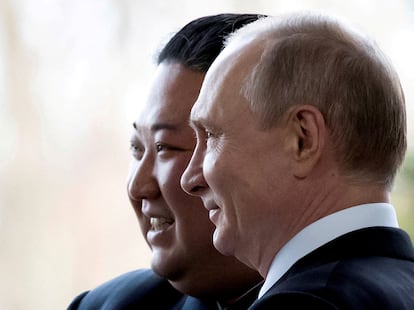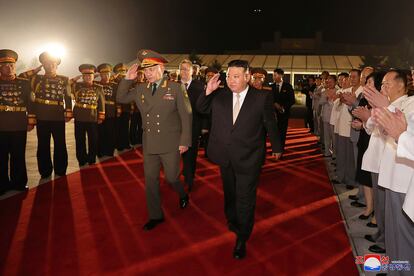Washington increasingly concerned by rapprochement between Russia and North Korea
The anticipated meeting between Kim Jong Un and Vladimir Putin has set alarm bells ringing over Pyongyang supplying weapons to Moscow in return for nuclear know-how


They might not be love letters, like those that former U.S. President Donald Trump says he exchanged with Kim Jong Un during his term in office. But the missives that Russian President Vladimir Putin and the North Korean leader have recently exchanged, according to Washington, do seem to have produced a similar result: a bilateral meeting. U.S. government sources have stated that Kim will travel to Russia to meet with Putin to discuss the sale of armaments for the war in Ukraine.
If confirmed — something that neither the Kremlin nor the North Korean KCNA news agency, which acts as Kim’s de facto spokesman, has yet done — Kim’s visit would be his first trip abroad since the beginning of the Covid-19 pandemic three years ago, when North Korea sealed its borders. It would also signal a warming of relations between Moscow and Pyongyang.
It is a rapprochement that is causing concern in Washington. On the one hand, North Korean arms sales would provide Moscow with a new means of overseas supplies — alternatives to those the U.S. already believes it receives from Iran — and it would also provide the Kremlin with fresh encouragement at a time when the United States senses new momentum in Ukraine’s counteroffensive. In return, North Korea could receive Russian military technology. On the other hand, the renewed friendship between the two would provide a counterweight to the trilateral security partnership that the U.S. signed in August with South Korea and Japan.
U.S. National Security Advisor Jake Sullivan said Tuesday in a press conference that so far, no significant flow of North Korean armament to Russia has been detected. And he noted that any such movement would violate UN Security Council resolutions. The United States “will continue to seek opportunities to dissuade North Korea” from selling arms to Moscow, Sullivan stressed, while also issuing a stern warning to Pyongyang.
“Providing weapons to Russia for use on the battlefield to attack grain silos and heating infrastructure of major cities as we head into winter, to try to conquer territory that belongs to another sovereign nation — this will not reflect well on North Korea, and they will pay a price for this in the international community,” Sullivan said.
The meeting between Putin and Kim, as advanced on Monday by The New York Times, will be held during the Eastern Economic Forum summit in Vladivostok, eastern Russia, between September 10 and 13. That could mean that Kim would not be in Pyongyang for the commemoration of the Day of the Foundation of the Republic, September 9. The North Korean leader would travel to Russia by armored train, his preferred method. He previously used the train in 2019 for his first and only in-person meeting with Putin, which also took place in Vladivostok.
The White House had warned last week that Russia and North Korea were in talks for Pyongyang to supply ammunition and other military hardware to Moscow. Those talks, said National Security Council spokesman John Kirby, had advanced in recent weeks to the point of reaching the level of heads of state: Putin and Kim exchanged letters in which they agreed to strengthen bilateral cooperation.

Shoigu’s visit to Pyongyang
The key moment in Washington’s view came with the visit of Russian Defense Minister Sergei Shoigu to Pyongyang in July. During that visit, Kim himself accompanied the head of the Russian Armed Forces on a visit to a military arms exhibition. Shoigu invited the North Korean supreme leader to visit his country and, according to Kirby, “tried to convince Pyongyang to sell ammunition to Russia.” “Our information indicates that following that trip other Russian officials went to North Korea on a follow-up visit on potential arms sales deals to Russia,” the spokesman added.
“Russia is negotiating potential deals for significant quantities and multiple types of munitions from the DPRK to be used against Ukraine,” said the U.S., UK, South Korea, and Japan in a joint statement issued at the United Nations. “These potential deals could also include the provision of raw materials that would assist Russia’s defence industrial base.”
This is not the first time Washington has accused North Korea of planning to supply ammunition to Moscow, although no evidence has ever been detected that these alleged plans by the Kim regime have ever materialized. In fact, the U.S. government believes that its warnings served as a deterrent to Pyongyang, at least temporarily.
Following the estrangement between the two countries after the fall of the Soviet Union and the end of Moscow’s assistance to its neighbor, the Kim regime has gradually drawn closer to Moscow in recent years. Pyongyang supports Russia’s invasion of Ukraine and has given its approval to the illegal annexation of provinces in the eastern Donbas region.
In part, this renewed friendship is based on a genuine affinity with Putin’s way of doing things. And in part it is the result of a pragmatic calculation. North Korea is seeking to avoid excessive dependence on China, its main partner, and has been watching the renewed attunement in the Washington-Seoul-Tokyo triangle with alarm.
The arms talks will not necessarily lead to military cooperation between Moscow and Pyongyang, some experts point out. It is true that one of Kim’s major objectives is to develop his military industry to maintain it as a deterrent against a possible U.S. attack, having succeeded in manufacturing nuclear warheads. In the last three years he has taken steps to develop hypersonic rockets and sea-to-surface nuclear missiles, and could benefit from a collaboration with Russia to provide technological know-how. But Pyongyang’s resources are limited and while it has managed to develop some cutting-edge technology — its latest military parades have flaunted its intercontinental missiles — it cannot manufacture in large quantities.
“[North Korea] has relatively cutting-edge technology, it’s true. But they will most likely produce such weaponry in small quantities, and the quality of such cutting-edge weaponry will predictably be inferior to Russia’s,” Kookmin University professor Andrei Lankov told the website NK News, which specializes in information about North Korea.
But in the game of smoke and mirrors that often characterizes North Korean foreign policy, the mere perception in Washington — and South Korea and Japan — of intensifying collaboration between Russia and North Korea already represents a victory in Pyongyang in its aspirations for deterrence.
“North Korea has explicitly supported Russia and has strengthened its ties with Russia. Under these circumstances, the chances of the North and Russia cooperating on an arms pact are becoming greater and greater,” a South Korean government source told the Yonhap news agency. The official called on Pyongyang to keep its contacts with Moscow within the limits of UN resolutions and international law: “Cooperation between North Korea and a neighboring country must be conducted in all its forms in a direction that does not harm international peace and order.”
In Moscow, the Kremlin merely indicated that it could not confirm and had nothing to say about the possible meeting. But on Monday, Shoigu recalled that the two countries are discussing the possibility of joint military maneuvers: “We are discussing it with everyone, including the Democratic People’s Republic of Korea. Why not? These are our neighbors.”
Sign up for our weekly newsletter to get more English-language news coverage from EL PAÍS USA Edition
Tu suscripción se está usando en otro dispositivo
¿Quieres añadir otro usuario a tu suscripción?
Si continúas leyendo en este dispositivo, no se podrá leer en el otro.
FlechaTu suscripción se está usando en otro dispositivo y solo puedes acceder a EL PAÍS desde un dispositivo a la vez.
Si quieres compartir tu cuenta, cambia tu suscripción a la modalidad Premium, así podrás añadir otro usuario. Cada uno accederá con su propia cuenta de email, lo que os permitirá personalizar vuestra experiencia en EL PAÍS.
¿Tienes una suscripción de empresa? Accede aquí para contratar más cuentas.
En el caso de no saber quién está usando tu cuenta, te recomendamos cambiar tu contraseña aquí.
Si decides continuar compartiendo tu cuenta, este mensaje se mostrará en tu dispositivo y en el de la otra persona que está usando tu cuenta de forma indefinida, afectando a tu experiencia de lectura. Puedes consultar aquí los términos y condiciones de la suscripción digital.








































